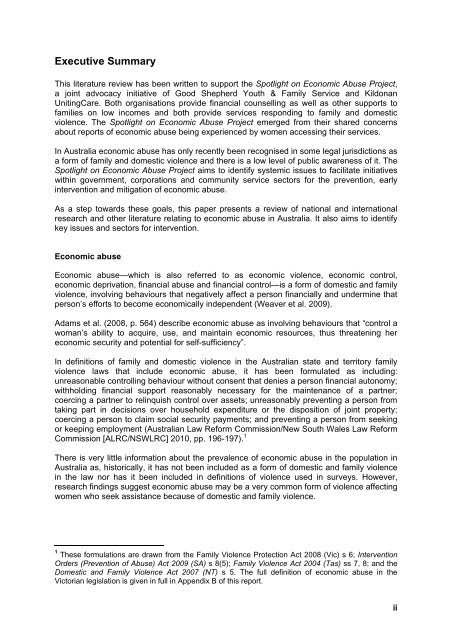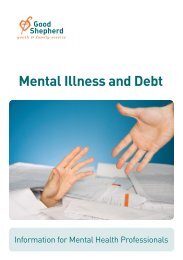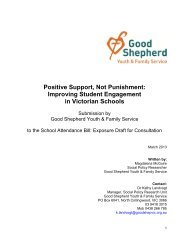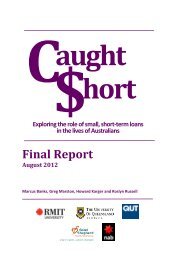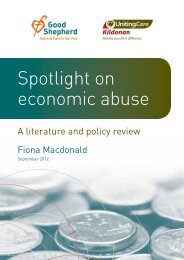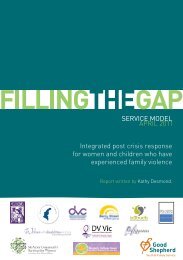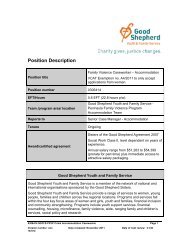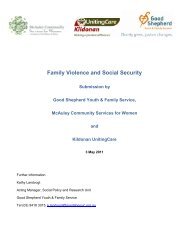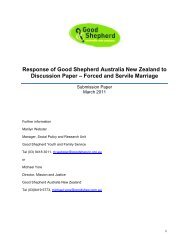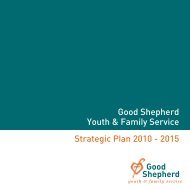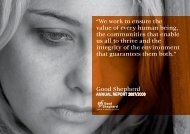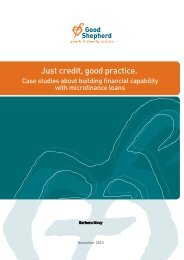Spotlight on economic abuse - Good Shepherd Youth & Family ...
Spotlight on economic abuse - Good Shepherd Youth & Family ...
Spotlight on economic abuse - Good Shepherd Youth & Family ...
Create successful ePaper yourself
Turn your PDF publications into a flip-book with our unique Google optimized e-Paper software.
Executive Summary<br />
This literature review has been written to support the <str<strong>on</strong>g>Spotlight</str<strong>on</strong>g> <strong>on</strong> Ec<strong>on</strong>omic Abuse Project,<br />
a joint advocacy initiative of <strong>Good</strong> <strong>Shepherd</strong> <strong>Youth</strong> & <strong>Family</strong> Service and Kild<strong>on</strong>an<br />
UnitingCare. Both organisati<strong>on</strong>s provide financial counselling as well as other supports to<br />
families <strong>on</strong> low incomes and both provide services resp<strong>on</strong>ding to family and domestic<br />
violence. The <str<strong>on</strong>g>Spotlight</str<strong>on</strong>g> <strong>on</strong> Ec<strong>on</strong>omic Abuse Project emerged from their shared c<strong>on</strong>cerns<br />
about reports of ec<strong>on</strong>omic <strong>abuse</strong> being experienced by women accessing their services.<br />
In Australia ec<strong>on</strong>omic <strong>abuse</strong> has <strong>on</strong>ly recently been recognised in some legal jurisdicti<strong>on</strong>s as<br />
a form of family and domestic violence and there is a low level of public awareness of it. The<br />
<str<strong>on</strong>g>Spotlight</str<strong>on</strong>g> <strong>on</strong> Ec<strong>on</strong>omic Abuse Project aims to identify systemic issues to facilitate initiatives<br />
within government, corporati<strong>on</strong>s and community service sectors for the preventi<strong>on</strong>, early<br />
interventi<strong>on</strong> and mitigati<strong>on</strong> of ec<strong>on</strong>omic <strong>abuse</strong>.<br />
As a step towards these goals, this paper presents a review of nati<strong>on</strong>al and internati<strong>on</strong>al<br />
research and other literature relating to ec<strong>on</strong>omic <strong>abuse</strong> in Australia. It also aims to identify<br />
key issues and sectors for interventi<strong>on</strong>.<br />
Ec<strong>on</strong>omic <strong>abuse</strong><br />
Ec<strong>on</strong>omic <strong>abuse</strong>—which is also referred to as ec<strong>on</strong>omic violence, ec<strong>on</strong>omic c<strong>on</strong>trol,<br />
ec<strong>on</strong>omic deprivati<strong>on</strong>, financial <strong>abuse</strong> and financial c<strong>on</strong>trol—is a form of domestic and family<br />
violence, involving behaviours that negatively affect a pers<strong>on</strong> financially and undermine that<br />
pers<strong>on</strong>’s efforts to become ec<strong>on</strong>omically independent (Weaver et al. 2009).<br />
Adams et al. (2008, p. 564) describe ec<strong>on</strong>omic <strong>abuse</strong> as involving behaviours that “c<strong>on</strong>trol a<br />
woman’s ability to acquire, use, and maintain ec<strong>on</strong>omic resources, thus threatening her<br />
ec<strong>on</strong>omic security and potential for self-sufficiency”.<br />
In definiti<strong>on</strong>s of family and domestic violence in the Australian state and territory family<br />
violence laws that include ec<strong>on</strong>omic <strong>abuse</strong>, it has been formulated as including:<br />
unreas<strong>on</strong>able c<strong>on</strong>trolling behaviour without c<strong>on</strong>sent that denies a pers<strong>on</strong> financial aut<strong>on</strong>omy;<br />
withholding financial support reas<strong>on</strong>ably necessary for the maintenance of a partner;<br />
coercing a partner to relinquish c<strong>on</strong>trol over assets; unreas<strong>on</strong>ably preventing a pers<strong>on</strong> from<br />
taking part in decisi<strong>on</strong>s over household expenditure or the dispositi<strong>on</strong> of joint property;<br />
coercing a pers<strong>on</strong> to claim social security payments; and preventing a pers<strong>on</strong> from seeking<br />
or keeping employment (Australian Law Reform Commissi<strong>on</strong>/New South Wales Law Reform<br />
Commissi<strong>on</strong> [ALRC/NSWLRC] 2010, pp. 196-197). 1<br />
There is very little informati<strong>on</strong> about the prevalence of ec<strong>on</strong>omic <strong>abuse</strong> in the populati<strong>on</strong> in<br />
Australia as, historically, it has not been included as a form of domestic and family violence<br />
in the law nor has it been included in definiti<strong>on</strong>s of violence used in surveys. However,<br />
research findings suggest ec<strong>on</strong>omic <strong>abuse</strong> may be a very comm<strong>on</strong> form of violence affecting<br />
women who seek assistance because of domestic and family violence.<br />
1 These formulati<strong>on</strong>s are drawn from the <strong>Family</strong> Violence Protecti<strong>on</strong> Act 2008 (Vic) s 6; Interventi<strong>on</strong><br />
Orders (Preventi<strong>on</strong> of Abuse) Act 2009 (SA) s 8(5); <strong>Family</strong> Violence Act 2004 (Tas) ss 7, 8; and the<br />
Domestic and <strong>Family</strong> Violence Act 2007 (NT) s 5. The full definiti<strong>on</strong> of ec<strong>on</strong>omic <strong>abuse</strong> in the<br />
Victorian legislati<strong>on</strong> is given in full in Appendix B of this report.<br />
ii


